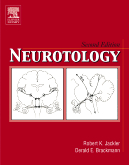The History of Neurotology and Skull Base Surgery
Part I: Anatomy, Physiology, and Pathology
1. The human brainstem auditory system
2. Physiology of the ear and the auditory nervous system
3. Anatomy of the central vestibular system
4. Physiology of the vestibular system
5. Molecular genetics in neurotology
6. Pathological correlates in neurotology
Part II: Symptoms of Neurotologic Disease
7. Hearing loss in neurotologic diagnosis
8. Symptoms of vestibular disease
9. Tinnitus
10. Otalgi
11. Pulsatile tinnitus: Advances in diagnosis and treatment
Part III: Neurotologic Diagnosis
12. The neurotologic examination
13. Neuro-ophthalmologic manifestations of neurotologic disease
14. Otolith dysfunction and semicircular canal dysfunction
15. Dynamic posturography
16. Vestibular evoked myogenic potentials
17. Central auditory testing
18. Acoustic and electrical testing of the auditory pathway
19. Functional imaging of auditory cortical activity
Part IV: Neuroradiology
20. Imaging of the labyrinth
21. Imaging of the cerebellopontine angle
22. Imaging of the lateral skull base
23. Imaging of the facial nerve
24. Diagnostic and therapeutic angiography
Part V: Neurotologic Manifestations of Neurologic Disease
25. Auditory neuropathy, sarcoidosis, siderosis, and idiopathic pachymeningitis
26. Vestibular neuritis
27. Meningitis
28. Demyelinating diseases
29. Migraine
30. Seizure disorders
31. Increased intracranial pressure
32.vertigo, dysequilibrium, and imbalance with aging
33. Cervical proprioceptive dysfunction
34. Paraneoplastic disorders
Part VI: Pediatric Neurotology
35. Vestibular disorders in childhood
36. Central auditory system development and disorders
Part VII: Peripheral Audiovestibular Disorders
37. Cochlear hearing loss
38. Electronystagmography and rotation tests
39. Endolymphatic hydrops
40. Autoimmune inner ear disease
41. Benign paroxysmal positional vertigo (BPPY)
42. Pharmacotherapy of vestibular dysfunction
Part VIII: Surgical Neurotology
43. Overview of surgical neurotology
44. Complications in neurotologic surgery
45. Acoustic neuroma
46. Neurofibromatosis 2 (NF2)
47. Meningiomas of the posterior fossa and skull base
48. Epidermoid cysts of the cerebellopontine angle
49. Rare tumors of the cerebellopontine angle
50. Intrinsic brain tumors of the posterior fossa
51. Vascular compression syndrome
52. Facial nerve and intracranial complications of otitis media
53. Cerebrospinal fluid leak of temporal bone origin
54. Arteriovenous malformations
55. Neurotologic aspects of posterior fossa arachnoid cysts
56. Vestibular neurectomy
57. Intraoperative monitoring of cranial nerves
Part IX: Skull Base Diseases
58. Anatomy of the skull base
59. Soft tissue reconstruction in skull base surgery
60. Tumors of the temporal bone
61. Tumors of the jugular foramen
62. Management of clivus and parasellar space neoplasms
63. Temporal bone and skull base trauma
64. Temporal bone encephalocele
65. Otogenic skull base osteomyelitis
66. Lesions of the petrous apex
67. Diffuse osseous lesions of the temporal bone
68. Abnormalities of the craniovertebral junction 69. Innovative radiotherapy
of the cranial base
70. Complications of therapeutic radiation to the cranial base
Part X: Facial Nerve Disorders
71. Anatomy and physiology of the facial nerve
72. Overview of facial nerve surgery
73. Electrical testing of the facial nerve
74. The acute facial palsies
75. Tumors of the facial nerve
76. Iatrogenic facial nerve injury: prevention and management
Part XI: Rehabilitative Neurotology
77. Hearing aids and assistive listening devices
78. Implantable hearing devices
79. Cochlear implant technology
80. Cochlear implantation in adults
81. Cochlear implants in children
82. Auditory brainstem implant
83. Vestibular and balance rehabilitation
84. Ocular management and rehabilitation of the patient with facial paralysis
85. Rehabilitation of lower crani


